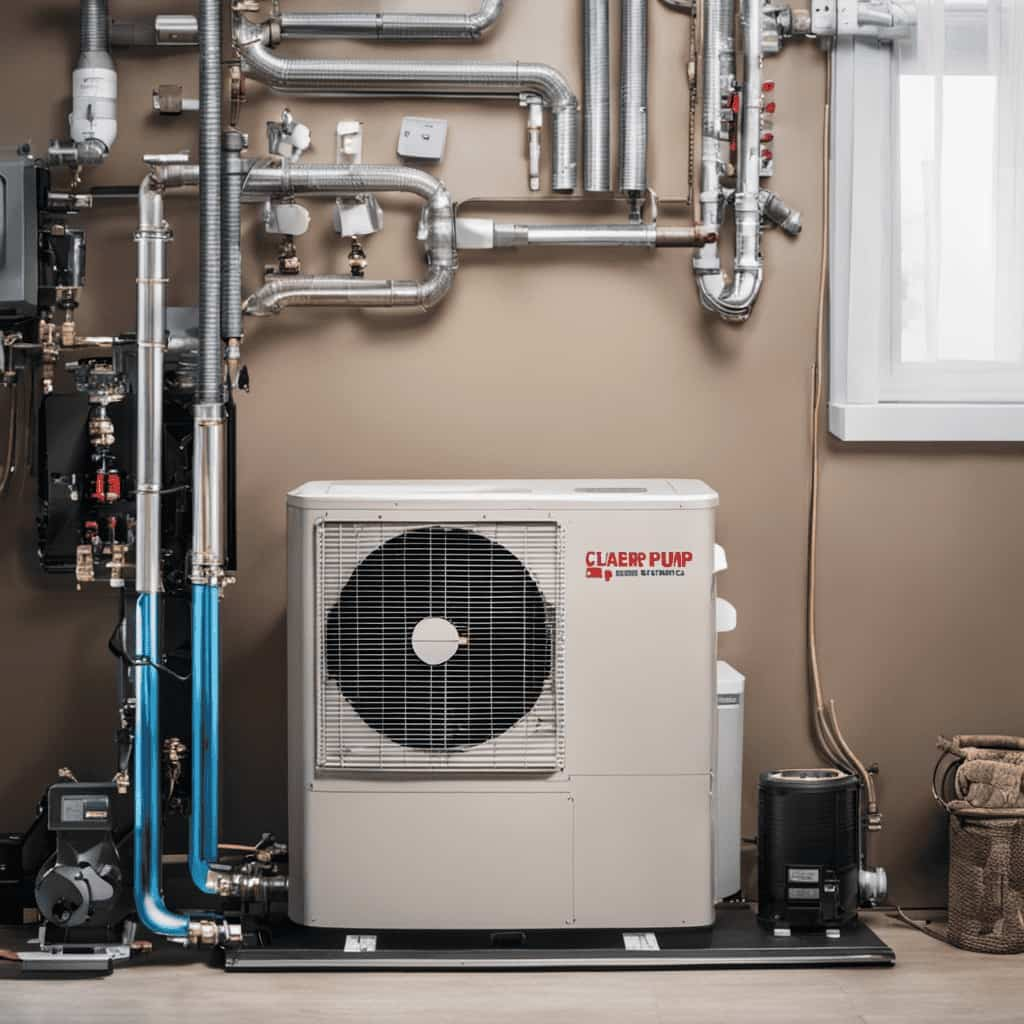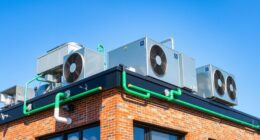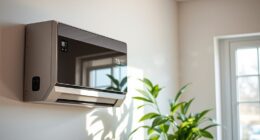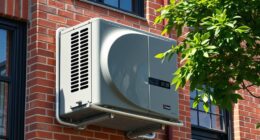Do you feel frustrated with expensive energy bills and ineffective heating? We have a solution for you.
In this article, we’ll share our top five tips for maximizing the efficiency of your heat pump.
From understanding efficiency ratings to choosing the right refrigerant, we’ll empower you to make informed decisions that will save you money and keep your home cozy.
Say goodbye to wasted energy and hello to a more comfortable and sustainable living space.

Key Takeaways
- Higher efficiency ratings, such as SEER and HSPF, indicate greater energy savings.
- Proper sizing and regular maintenance are crucial for optimal efficiency and performance.
- Utilizing programmable thermostats can maximize energy savings with heat pumps.
- Insulation and air leakage prevention significantly reduce energy consumption and improve heat pump efficiency.
Understanding Heat Pump Efficiency Ratings
We believe understanding heat pump efficiency ratings is essential for maximizing energy savings and performance.
Heat pump efficiency standards determine how effectively a heat pump can convert energy into heat or cool air. The higher the efficiency rating, the more energy-efficient the heat pump will be. Energy-saving heat pump technologies, such as variable speed compressors and advanced heat exchangers, can significantly improve efficiency.
When shopping for a heat pump, look for the Seasonal Energy Efficiency Ratio (SEER) and the Heating Seasonal Performance Factor (HSPF) ratings. The SEER measures cooling efficiency, while the HSPF measures heating efficiency. Aim for higher SEER and HSPF ratings to ensure optimal energy savings.
Proper Sizing for Optimal Efficiency
To achieve optimal efficiency, it’s important to properly size your heat pump. Here are some sizing considerations to keep in mind for an energy efficient design:

Conduct a load calculation: Determine the heating and cooling needs of your space by considering factors like insulation, square footage, number of occupants, and climate. This will help you select a heat pump that’s the right size for your specific requirements.
Avoid oversized units: While it may seem beneficial to have a larger heat pump, oversized units can actually lead to inefficiencies. They tend to cycle on and off frequently, resulting in higher energy consumption and reduced comfort.
Consult with a professional: Working with a qualified HVAC technician is crucial for accurate sizing. They have the expertise to perform proper calculations and recommend the right size heat pump for your home.
By properly sizing your heat pump, you can ensure optimal efficiency and performance.

Now, let’s explore the importance of regular maintenance and cleaning for your heat pump.
Importance of Regular Maintenance and Cleaning
Regular maintenance and cleaning are essential for ensuring the optimal performance and energy efficiency of your heat pump. By regularly maintaining your heat pump, you can prevent issues that could decrease its efficiency and increase energy consumption.
This includes cleaning or replacing the air filters, inspecting the outdoor unit for debris and obstructions, and checking the refrigerant levels. Regular maintenance also involves checking and tightening electrical connections, lubricating moving parts, and inspecting the belts for wear and tear.
By keeping your heat pump clean and well-maintained, you can maximize its energy efficiency, extend its lifespan, and minimize the chances of costly repairs. With regular maintenance and cleaning, you can enjoy the benefits of a more efficient and reliable heat pump.

Now let’s move on to the next section, which focuses on utilizing programmable thermostats for energy savings.
Utilizing Programmable Thermostats for Energy Savings
When it comes to maximizing energy savings with heat pumps, utilizing programmable thermostats is key.
By setting optimal temperature settings and creating customized heating schedules, homeowners can ensure that their heat pumps operate efficiently and only when needed.
Additionally, taking advantage of energy-saving thermostat features, such as smart sensors and adaptive learning, can further enhance energy efficiency and reduce utility costs.

Optimal Temperature Settings
Our article explores the ways in which programmable thermostats can help us achieve optimal temperature settings for energy savings. By utilizing these thermostats, we can implement customized temperature settings that align with our energy saving strategies. Here are three ways in which programmable thermostats can assist in achieving optimal temperature settings:
Setback feature: Programmable thermostats allow us to lower the temperature during periods when we’re away from home or asleep, reducing unnecessary energy consumption.
Smart scheduling: With programmable thermostats, we can create heating and cooling schedules based on our daily routines, ensuring that our homes are at comfortable temperatures when needed and saving energy when not in use.
Remote control: Some programmable thermostats offer remote access, allowing us to adjust the temperature settings even when we’re away from home, ensuring optimal energy efficiency.

By implementing these strategies, we can maximize the energy-saving potential of our heat pumps and create a comfortable living environment while reducing our carbon footprint.
Now, let’s delve into the next section about customized heating schedules.
Customized Heating Schedules
By utilizing programmable thermostats and creating customized heating schedules, we can effectively save energy and optimize the performance of our heat pumps.
Customized heating schedules allow us to set specific temperatures for different times of the day, ensuring that our heat pumps are only working when needed. This can result in significant energy savings by avoiding unnecessary heating during periods when we aren’t at home or when we’re sleeping. By programming lower temperatures during these times, we can reduce energy consumption without sacrificing comfort.

Additionally, programmable thermostats allow us to easily adjust our customized temperature settings to adapt to changes in our daily routines.
These energy-saving strategies not only help us reduce our carbon footprint but also save money on our energy bills.
Energy-Saving Thermostat Features
Utilizing programmable thermostats and taking advantage of their energy-saving features can help us optimize our heat pump’s performance and save on energy costs. Here are three energy-saving thermostat settings and smart thermostat features to consider:
Programmable schedules: Set specific temperature levels for different times of the day. For example, you can lower the temperature when you’re away from home or asleep, and raise it when you’re typically active.

Geofencing: Some smart thermostats can detect when you’re leaving or approaching home based on your smartphone’s location. This feature allows the thermostat to adjust the temperature accordingly, ensuring energy isn’t wasted when you’re not there.
Learning capabilities: Smart thermostats with learning capabilities can analyze your heating patterns and adjust settings accordingly. Over time, they can adapt to your preferences and create a customized heating schedule that maximizes energy efficiency.
By utilizing these energy-saving thermostat features, we can maximize our heat pump’s efficiency and reduce energy consumption.
Now, let’s explore how maximizing insulation and sealing air leaks can further enhance our energy savings.

Maximizing Insulation and Sealing Air Leaks
We can enhance energy efficiency by ensuring proper insulation and sealing any air leaks in our homes. Sealing air leaks is crucial because it prevents warm air from escaping during winter and cool air from leaking out in the summer.
One effective way to seal air leaks is by using weatherstripping around windows and doors. Caulking can also be used to seal gaps and cracks in walls, ceilings, and floors.
Another important aspect of maximizing insulation is to insulate the attic, walls, and floors. This helps to maintain a consistent temperature inside the house and reduces the workload on the heat pump.
By sealing air leaks and improving insulation techniques, we can significantly reduce energy consumption and improve the overall efficiency of our heat pumps.
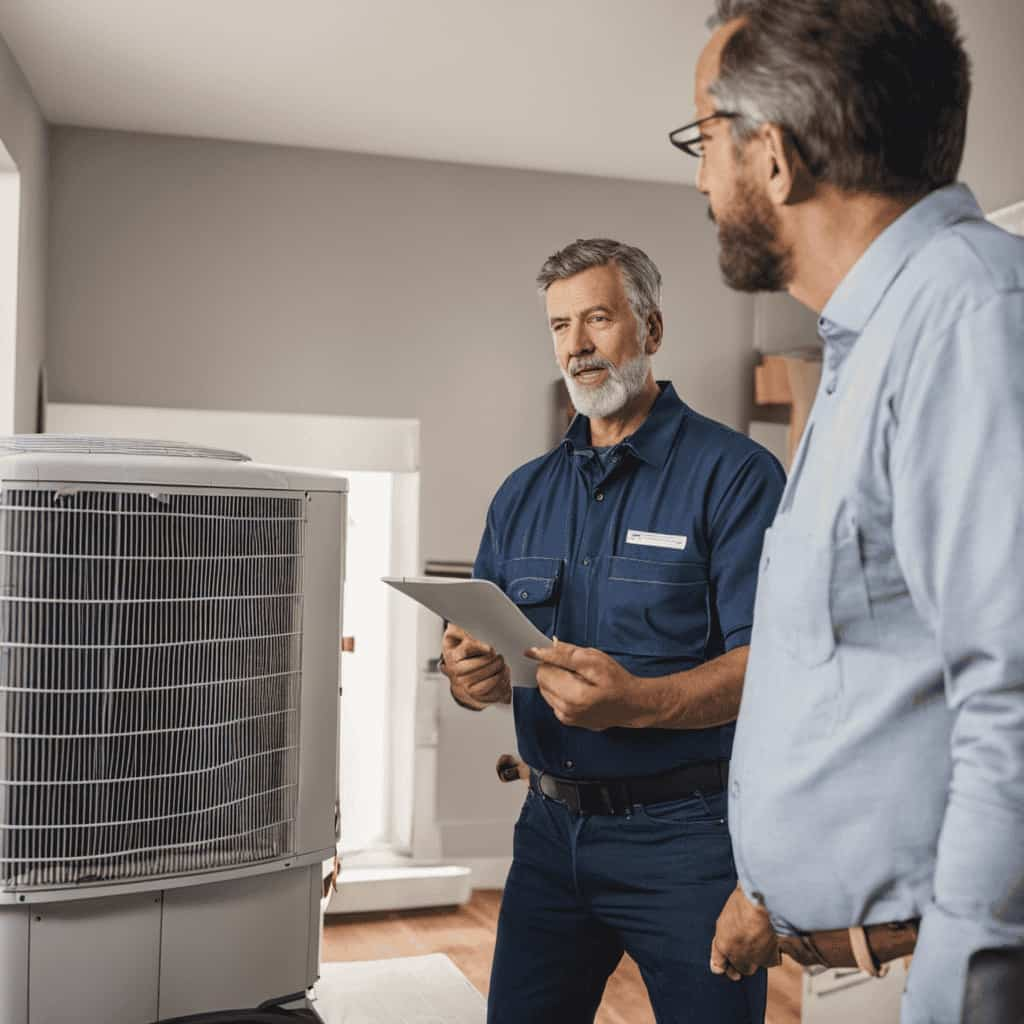
Now, let’s move on to the next section where we’ll discuss choosing the right refrigerant for energy efficiency.
Choosing the Right Refrigerant for Energy Efficiency
When it comes to maximizing energy efficiency in heat pumps, choosing the right refrigerant is crucial. The optimal refrigerant can significantly impact the overall efficiency of the system.
Additionally, it’s important to consider the environmental impact of the refrigerant, as certain options can have a negative effect on the environment.
Optimal Refrigerant for Efficiency
The optimal refrigerant for efficiency is an important factor to consider when choosing a heat pump. Here are three key points to keep in mind when selecting the right refrigerant for energy efficiency:

Optimal refrigerant alternatives: Traditional refrigerants like R-22 can have a high global warming potential (GWP). Consider using newer, more environmentally friendly refrigerants such as R-410A or R-32, which have lower GWPs and better energy efficiency.
Refrigerant efficiency standards: Look for heat pumps that meet or exceed industry standards for refrigerant efficiency. The Seasonal Energy Efficiency Ratio (SEER) and Heating Seasonal Performance Factor (HSPF) ratings indicate the overall efficiency of a heat pump, including the refrigerant system.
Regular maintenance: Proper maintenance, including regular refrigerant checks and leak detection, can help ensure optimal efficiency and prevent refrigerant loss.
Considering these factors will help you choose a heat pump with the optimal refrigerant for efficiency.

Now, let’s move on to discussing the environmental impact of refrigerants.
Environmental Impact of Refrigerants
Choosing the right refrigerant for energy efficiency and minimizing the environmental impact is crucial when considering heat pumps. The refrigerant used in heat pumps can have a significant effect on the environment, especially when it comes to refrigerant disposal.
Many traditional refrigerants, such as chlorofluorocarbons (CFCs) and hydrochlorofluorocarbons (HCFCs), contribute to ozone depletion and have a high global warming potential. It’s important to choose eco-friendly alternatives that have a lower environmental impact.
Opting for refrigerants like hydrofluorocarbons (HFCs) with lower global warming potentials can help reduce the environmental impact. Additionally, considering natural refrigerants like carbon dioxide (CO2) or ammonia (NH3) can be even more environmentally friendly.

Optimizing Airflow for Improved Heat Pump Performance
One of the most important aspects to consider for improved heat pump performance is ensuring optimal airflow. Proper airflow optimization can significantly enhance the efficiency and effectiveness of a heat pump system.
Here are three tips to achieve optimal airflow:
Regularly clean and replace air filters: Clogged or dirty filters restrict airflow and force the heat pump to work harder, which reduces its performance. Clean or replace filters every one to three months.
Keep outdoor units clear: Ensure that the area around the outdoor unit is free from debris, vegetation, and obstructions. This allows for unrestricted airflow and prevents the heat pump from overheating.

Maintain proper airflow balance: Ensure that the supply and return vents inside the house are open and unblocked. Proper balance of airflow throughout the system optimizes heat distribution and improves overall performance.
Exploring Supplemental Heating Options for Cold Climates
For optimal performance in cold climates, we can explore and utilize supplemental heating options in conjunction with our heat pump system. By incorporating supplemental heat sources, we can ensure that our homes remain warm and comfortable during extreme cold weather conditions. One highly effective supplemental heating option is geothermal heating. Geothermal heating utilizes the natural heat from the earth to warm our homes. This method is not only energy-efficient but also environmentally friendly. It offers several benefits, such as lower heating costs, reduced carbon footprint, and improved indoor air quality. By tapping into the earth’s heat, geothermal heating provides a reliable and consistent source of warmth, even in the coldest climates. Consider implementing geothermal heating as a reliable and efficient supplemental heating option for your home.
| Benefits of Geothermal Heating |
|---|
| Lower heating costs |
| Reduced carbon footprint |
| Improved indoor air quality |
| Reliable and consistent source of warmth |
| Effective in the coldest climates |
Frequently Asked Questions
Can a Heat Pump Be Used as the Sole Source of Heating in Extremely Cold Climates?
Yes, a heat pump can be used as the sole source of heating in extremely cold climates. However, it is important to consider the heat pump’s efficiency and heating capacity to ensure optimal performance.
What Are the Potential Energy Savings From Using a Programmable Thermostat With a Heat Pump?
Potential energy savings from programming a thermostat with a heat pump can be significant. We’ve found that by setting temperature schedules, we can optimize efficiency and reduce energy consumption, leading to noticeable savings on our utility bills.

How Often Should a Heat Pump Be Professionally Inspected and Cleaned?
We should have our heat pump professionally inspected and cleaned regularly to ensure optimal performance. Regular maintenance benefits include increased energy efficiency, extended lifespan, and reduced risk of breakdowns.
Are There Any Government Incentives or Tax Credits Available for Installing an Energy-Efficient Heat Pump?
Yes, there are government incentives and tax credits available for installing an energy-efficient heat pump. These incentives and credits can help offset the cost of purchasing and installing a heat pump, making it a more affordable option for homeowners.
Can a Heat Pump Be Installed in Any Type of Home, or Are There Specific Requirements or Limitations?
Yes, a heat pump can be installed in any type of home. However, there may be specific requirements or limitations depending on the heat pump installation process and the compatibility of the heat pump with older homes.
What are Some Ways to Improve the Efficiency of Heat Pump HVACs?
Boosting efficiency of heat pump hvacs can be achieved through various methods. Regular maintenance, such as cleaning the filters and ensuring proper airflow, plays a crucial role. Upgrading to a programmable thermostat allows better control over temperature settings. Additionally, improving insulation and sealing any air leaks in the house can create a more efficient environment for the heat pump to operate.
Conclusion
In conclusion, by following these essential tips for energy-efficient heat pumps, homeowners can maximize their savings and reduce their environmental impact.

For example, a case study conducted in a cold climate showed that by properly sizing the heat pump and regularly maintaining it, the homeowner was able to cut their heating costs by 30% and decrease their carbon footprint.
Implementing these tips can lead to significant energy savings and a more comfortable and sustainable home.

